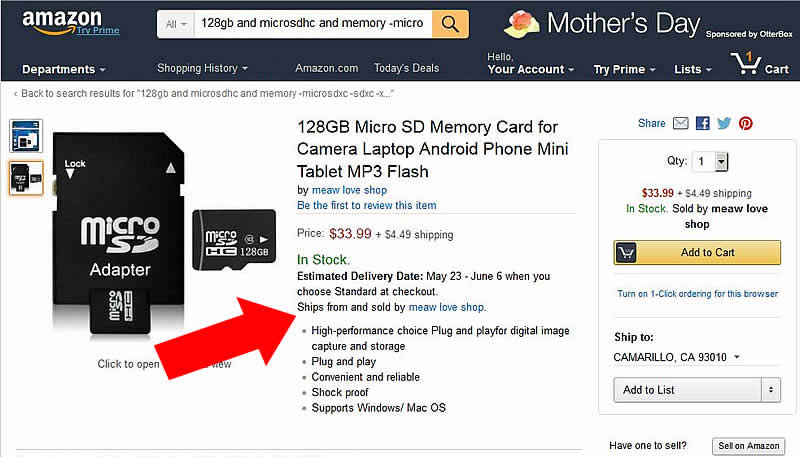Amazon, eBay, Alibaba Counterfeits Hurt Consumers, Manufacturers
Websites won’t knock off the knockoffs
October 12, 2016 - Los Angeles, CA – Imagine you are a manufacturer of a well-known global product or pharmaceutical brand. You have spent millions, perhaps billions, researching and building your products, reputation, advertising, distribution, staff, storefronts, warranty service, customer base and shareholder confidence. Then, you find out e-commerce websites Amazon® (AMZN), eBay® (EBAY) and Alibaba® (BABA) are selling counterfeit versions of your trademarked products, your consumers are being deceived, warranty claims are being made, and your business is at risk.
If you are a consumer, you may never know you received a visually deceptive counterfeit and may be entitled to a refund. Amazon, eBay and Alibaba won't tell you received a fake -- even when it's a dangerous or potentially deadly product.
Amazon, eBay and Alibaba are no strangers to allegations of selling counterfeit goods. The e-commerce giants face a “credibility crisis” fueled by a failure to crack down on counterfeit goods and making it easy for the world’s largest criminal enterprise to peddle $1.7 trillion in counterfeit goods to unsuspecting consumers. Social media sites Facebook®, Twitter® and Instagram® have also become popular counterfeit outlets, while Walmart® and Best Buy® were also caught selling counterfeits.
Counterfeiting is a $1.7 trillion global criminal enterprise; the criminals avoid taxes, destroy an estimated 750,000 US jobs, and cost US businesses over $250 Billion annually. Illegal counterfeiting activity is profitable, difficult to track and widely unpunished. While consumer awareness is only part of the global solution, counterfeited products are now very deceptive, and consumers often unknowingly purchase hazardous or deadly counterfeit products. It's the manufacturers and consumers who ultimately get hurt.
Amazon
Many consumers do not recognize that Amazon listings present three distinct global product outlet channels;
Amazon reports over 2-million Marketplace accounts (2014). Marketplace products are never touched by Amazon, but are shipped by sellers all over the world. The Counterfeit Report®, a popular consumer protection and education website, conducted dozens of name-brand test purchases from Amazon Fulfillment and Amazon Marketplace sellers, but never received an authentic item. Infringement notices were submitted for over 2,000 counterfeit items. Despite removal of the infringing listings, the sellers may remain. Amazon allows multiple sellers to list against “permanent catalog page” images making identification of counterfeit products difficult. The Amazon “A-to-Z Guarantee” covered the counterfeit purchases with an overall prompt and consumer confidence building response. A counterfeit item was received from an Amazon Direct purchase, so caution is still advised.
Our Recommendation:
Amazon Direct: |
BE ATTENTIVE |
|
Amazon Fulfillment: |
AVOID Trademarked Items |
|
Amazon Marketplace: |
AVOID Trademarked Items |
Look closely at the Amazon listing below and you can identify the Amazon Marketplace Seller “meaw love shop” shown here selling counterfeit 128GB microSDHC® memory cards. There is no such product in the microSDHC® standard – it is an obvious fake.

eBay
The Counterfeit Report purchased and received over 2,000 counterfeit products from eBay sellers representing over 400,000 counterfeit items listed or sold to eBay consumers. Many were fake items -- items that never existed in the manufacturer’s product line -- but had the manufacturer’s trademark and remain listed on eBay.
The Counterfeit Report also reported over 1.3 million counterfeit items to eBay, with over 550,000 reported sold to eBay consumers. While the sellers usually remain, the deceived eBay buyers are never told by eBay they received a fake and may be entitled to a refund. eBay has publicly admitted to allegations of deleting negative feedback, blocking accounts, changing resolved dispute cases, overturning refunds and removing counterfeit comments and warnings protecting consumers from dangerous products.
Our Recommendation: AVOID Trademarked Items
Alibaba
China’s bad-boy of counterfeits is facing re-inclusion on the Office of the United States Trade Representative (USTR) annual list of the world's most "notorious markets" for sales of pirated and counterfeit goods. Dozens of test purchases from Alibaba subsidiary AliExpress all proved to be counterfeit. It’s no surprise, Alibaba’s websites are awash in an avalanche of fakes.
The Counterfeit Report reported over 8 million counterfeit items to Alibaba, including over 9,000 items sold to consumers.
How many were re-listed is unknown. Alibaba says it relies on brand owners to monitor its websites and report problem listings, a common e-commerce strategy that allows profits while waiting for manufacturers to catch-up. Subsidiary Taobao.com claims it removed 114 million infringing listings in just 10 months in 2013, yet doesn’t respond to The Counterfeit Report’s infringement notices submitted on behalf of infringed manufacturers.
Our Recommendation: AVOID Trademarked ItemsWhen e-commerce companies don’t pay sufficient attention to these problems, consumer confidence fades and their brand integrity is tarnished. Regulation of the e-commerce marketplace is severely lacking, allowing very profitable online marketing, credit card processing, financing, and shipping services that effectuate the sale of the counterfeit products.
Buyer beware.
 |